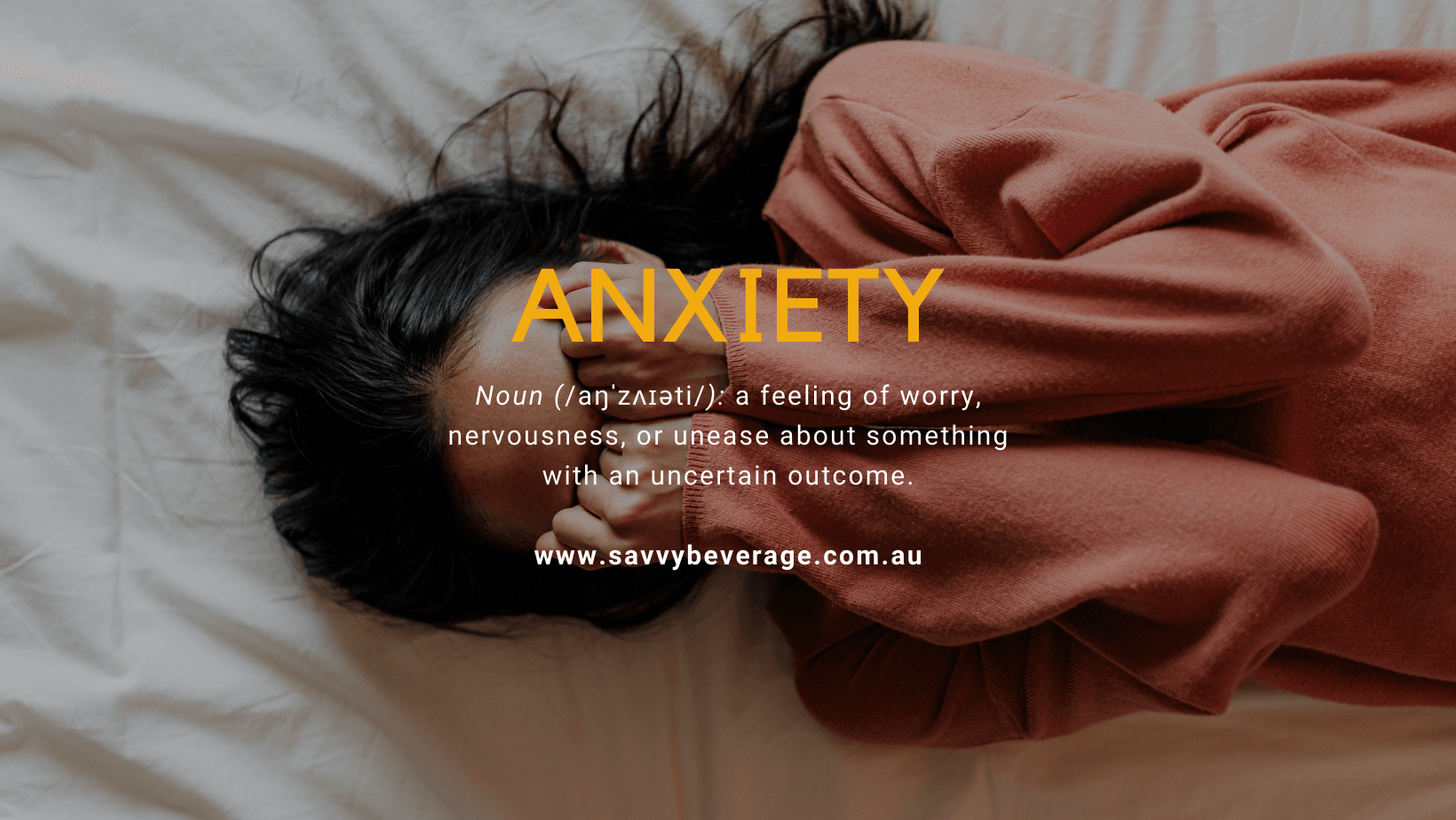
Natural Supplements That Help Treat Anxiety

|
Article at a glance |
|
What is Anxiety?
We will turn to the definition by Beyond Blue, one of the organisations Savvy supports, for their definition.
Anxiety is more than just feeling stressed or worried. While stress and anxious feelings are a common response to a situation where we feel under pressure, they usually pass once the stressful situation has passed, or ‘stressor’ is removed.
Absolutely everyone feels anxious from time to time! It’s extremely normal. It’s only when anxious feelings don't go away, or there’s feelings of anxiety for no particular reason, or the anxiety is so intense it makes it hard to cope with anything that it may be a sign of an anxiety condition [1].
Anxiety is the most common mental health condition in Australia. On average, one in three women and one in five men will experience an anxiety condition in their life.

There are many ways to help manage anxiety and help people with a condition. We will discuss some of the natural supplements that have scientific evidence behind their use to help with anxiety and stress.
Anxiety disorders are classified into numerous kinds, including generalised anxiety disorder, panic disorder, social anxiety, phobias, agoraphobia, separation anxiety, selective mutism, and medication-induced anxiety disorder. Psychological treatments, such as cognitive behaviour therapy or medication, are frequently used in treatment.
However, evidence shows that for persons with anxiety problems, dietary adjustments, such as taking specific vitamins, minerals, and other supplements, may be beneficial. Magnesium, Rhodiola Rosea, Vitamin D, Panax Ginseng, Saffron, Omega-3s, Ashwagandha, L-theanine, Vitamin C, Curcumin, B-vitamins and CBD are some of the dietary supplements that may aid with anxiety symptoms.

The Different Types Of Supplements
Many people in today's day and age have added vitamins and supplements into their daily routine in order to offer them a multiple range of health benefits. What supplements are we talking about exactly? The answer is minerals, herbs or other botanicals, amino acids, enzymes, and a variety of other compounds can be included in nutritional supplements in addition to vitamins. Dietary supplements are available in a number of formats, including pills, capsules, gummies, powders, beverages, and bars. B Vitamins and Vitamin C are popular vitamins, as are minerals like calcium and magnesium, herbs like Ashwagandha and Rhodiola Rosea, and products like glucosamine, probiotics, and omega3 oils.

The Benefits of some supplements
Magnesium
Magnesium is a vital element that aids the body's stress reaction. Magnesium supplements may also be useful for persons with anxiety, according to study, [2] and are typically safe and well accepted. For example, despite the low quality of available research on the issue, a 2017 assessment [3] of 18 studies indicated that magnesium supplements are likely to assist persons with anxiety. Another report [4] examines 112 patients with depression and revealed that taking 248 milligrams (mg) of elemental magnesium supplements daily for six weeks alleviated depression and anxiety symptoms.
L-Theanine
Green tea naturally contains L-theanine, an amino acid. When taken as a supplement, it has been found to have stress-relieving and anti-anxiety properties. [5] [6] Taking doses of L-theanine ranging from 200–400 mg per day, according to a review of nine studies published in 2020, [7] may help reduce stress and anxiety in those who are exposed to stressful situations. Supplementing with L-theanine has also been proven to assist with patients who experience schizophrenia, schizoaffective disorder, [8] and major depressive disorder [9] lessen their anxiety symptoms.
Vitamin C
Vitamin C is a nutrient that acts as a potent antioxidant in the body, and researchers believe it can assist patients with neuropsychological problems [10] such as anxiety, as well as counteract the damage produced by oxidative stress. [11] Furthermore, vitamin C supplements have been shown to be beneficial in the treatment of anxiety in various trials. In one research [12] of 42 high school students, consuming 500 mg of vitamin C per day for 14 days boosted blood vitamin C levels and decreased anxiety levels when compared to a placebo. Vitamin C supplements have also been demonstrated to help women and people with diabetes reduce anxiety symptoms.
Rhodiola Rosea
Rhodiola rosea (Rhodiola rosea) is a plant that grows in Russia and Asia. It's long been recognised as an adaptogen, a natural, nontoxic plant that boosts stress tolerance by stimulating the body's stress response system. [13] Two of Rhodiola's powerful active components, rosavin and salidroside, are connected to the herb's adaptogenic characteristics. A study [14] of 100 participants with chronic tiredness symptoms, such as poor sleep quality and short-term memory and attention deficits, revealed that supplementing with 400 mg of Rhodiola extract daily for just one week alleviated symptoms. Throughout the trial, the symptoms gradually faded.
To learn more about Rhodiola Rosea - click here.
Vitamin B Complex
All eight B vitamins are commonly found in B complex vitamins. By converting the food you consume into usable energy, these vitamins play a crucial role in metabolism. B vitamins are also necessary for the functioning of the heart and the brain. [15] Grains, meats, legumes, eggs, dairy products, and leafy greens are all good sources of B vitamins. Research [16] found findings indicating that taking B vitamins as part of a multivitamin and mineral supplement may help to enhance mood and stress levels by reducing homocysteine levels.
Other great examples are ashwagandha and panax ginseng.

Which Supplement Is For You?
If you're thinking about using supplements to help with anxiety, you should first consult with your doctor. Not all supplements are suitable or safe for those who suffer from anxiety, especially if they are using one or more drugs. Also keep an eye out for supplement mixtures that claim to alleviate or cure anxiety. While certain supplements have been found to aid with anxiety symptoms, other therapies such as counselling, food and lifestyle changes, and medication may be more successful. Always get supplements from trustworthy producers when you're out shopping. Look for supplements that are backed by science, and have been formulated by health professionals.
References:
[1] Epidemiology of anxiety disorders in the 21st century
[2] Magnesium Status and Stress: The Vicious Circle Concept Revisited
[3] The Effects of Magnesium Supplementation on Subjective Anxiety and Stress—A Systematic Review
[4] Role of magnesium supplementation in the treatment of depression: A randomized clinical trial
[10] Does Vitamin C Influence Neurodegenerative Diseases and Psychiatric Disorders?
[13] Rhodiola rosea for physical and mental fatigue: a systematic review
[15] B Vitamins and the Brain: Mechanisms, Dose and Efficacy—A Review







